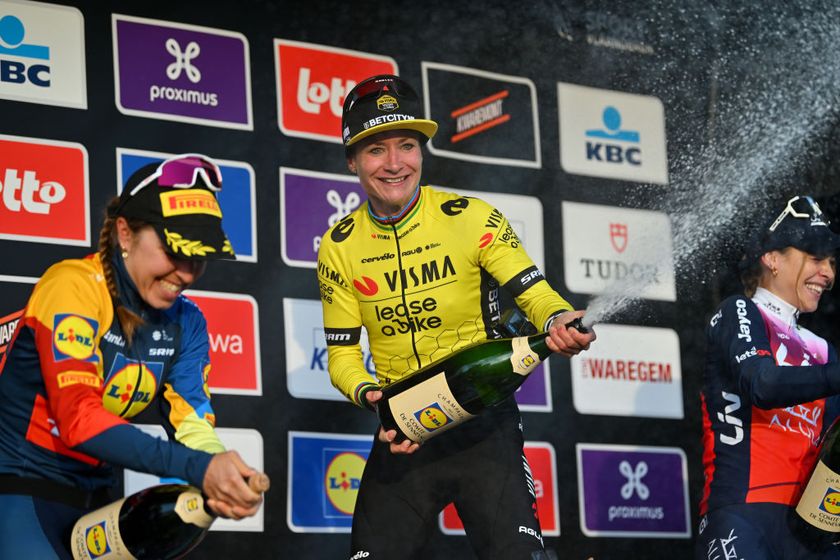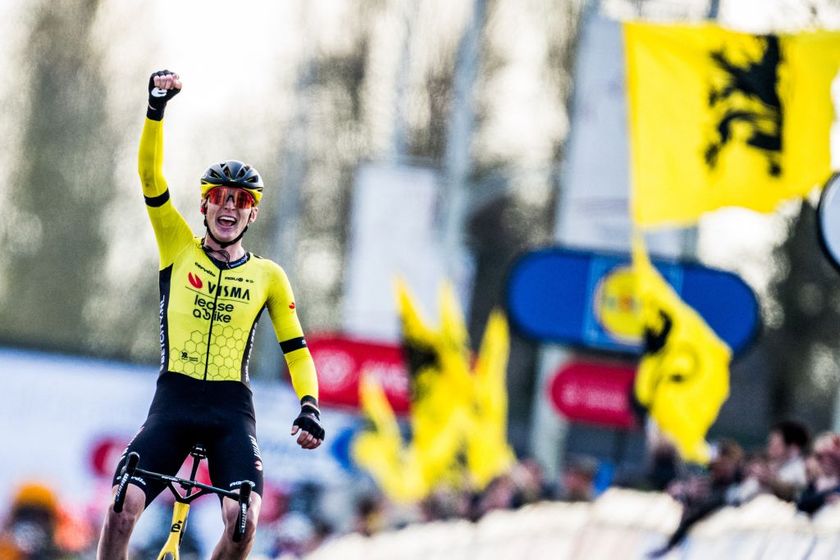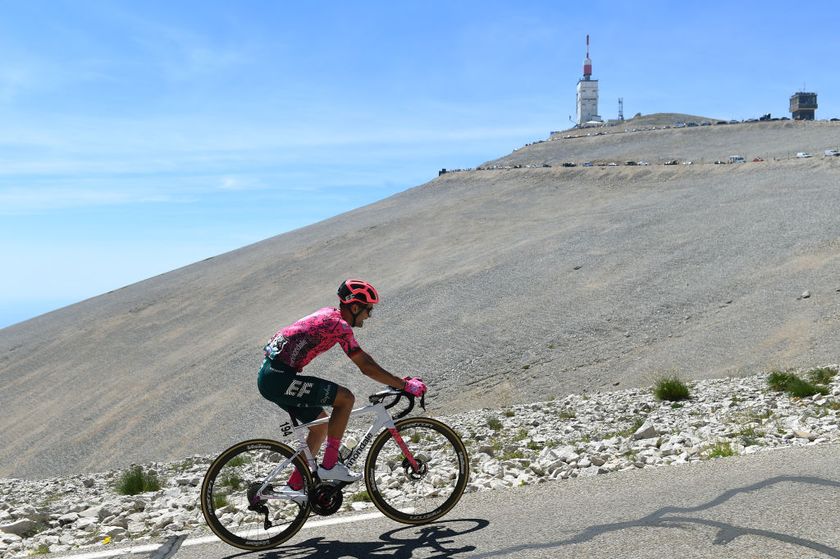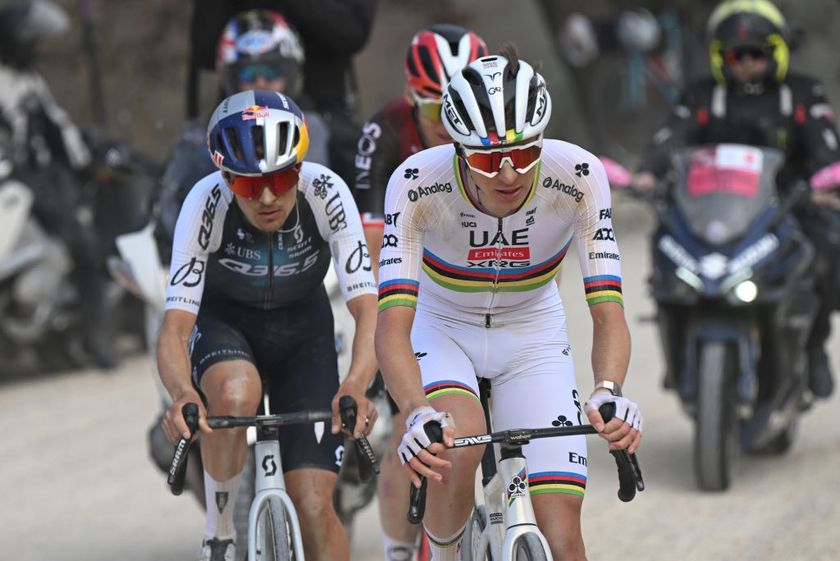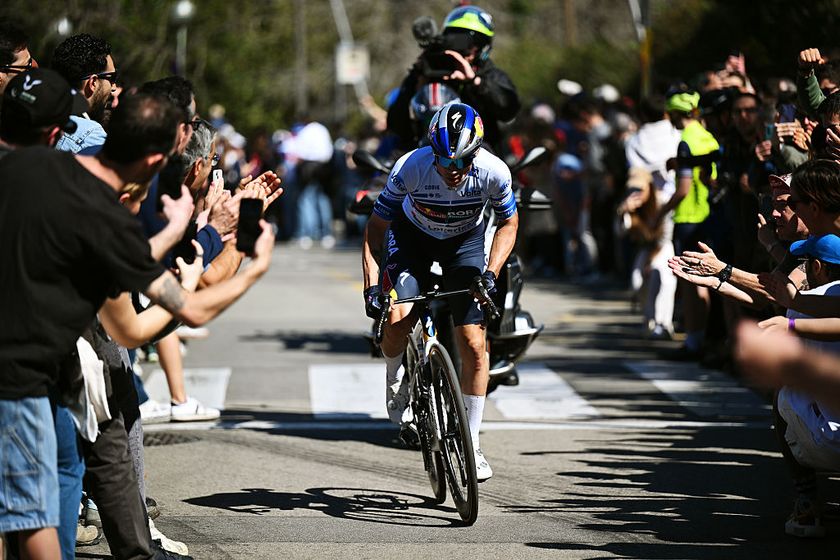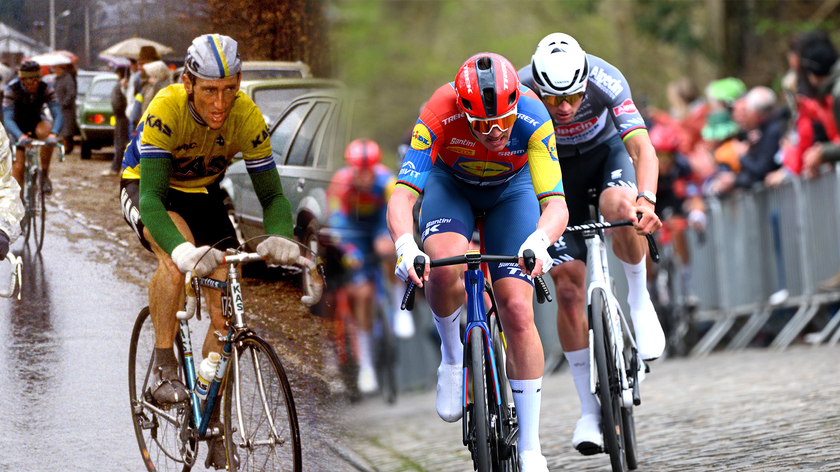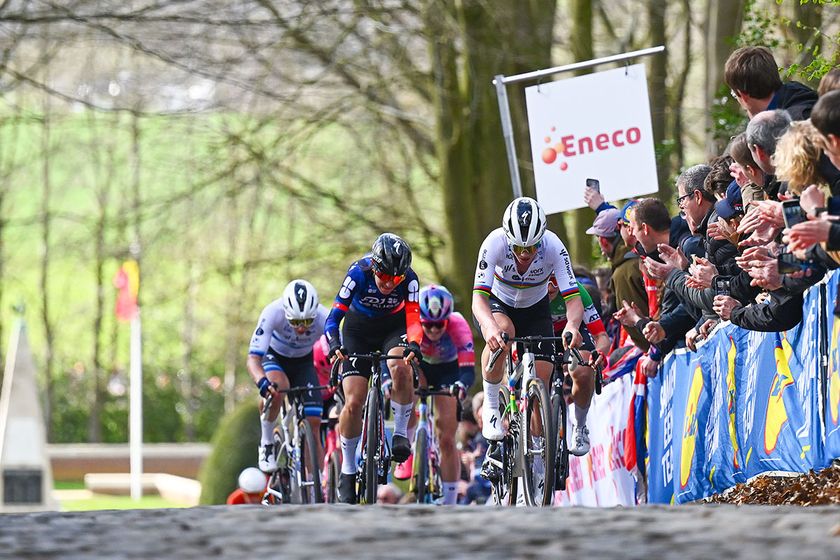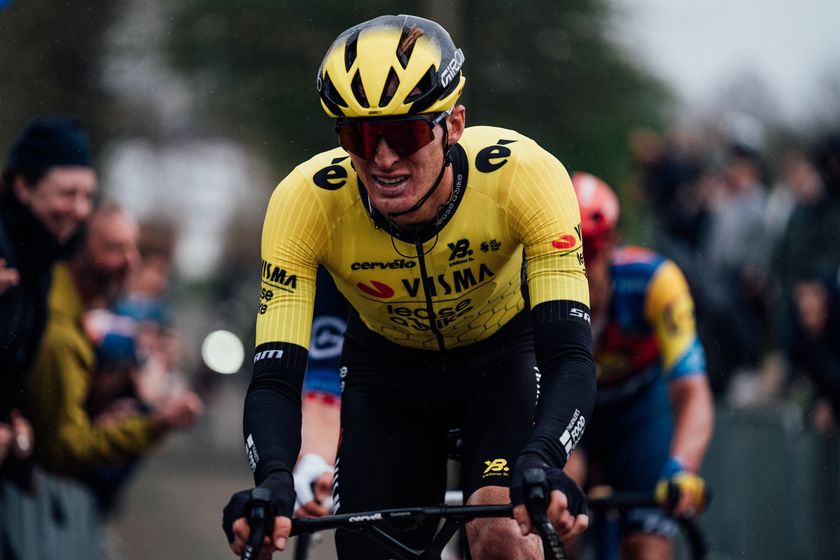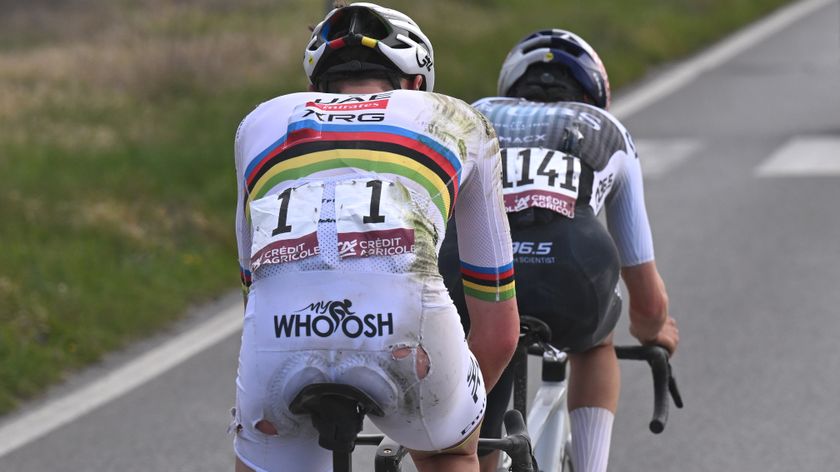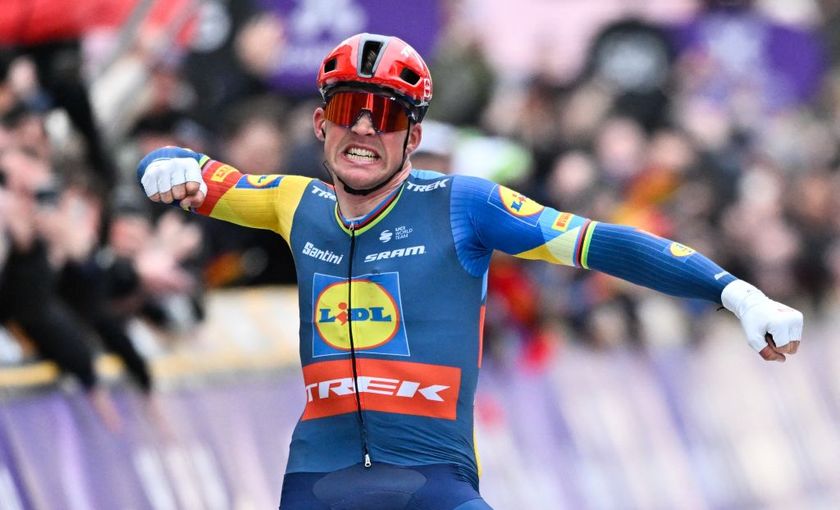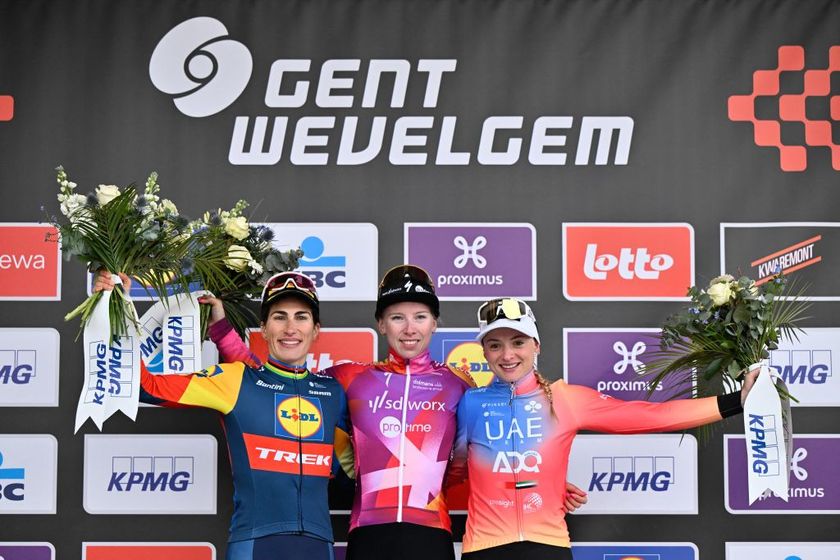The World Championships: Alejandro Valverde's white whale
A look back at the highs and lows of the Spaniard's six podium finishes






Alejandro Valverde is one of the favourites to win the gold medal in the men's World Championships road race on Sunday. If he does so, he will finally banish a 15-year itch and purge a long line of missed chances.
The Spaniard has finished on the Worlds podium no fewer than six occasions - more than any other rider - but has never stood on the top step.
"Cycling is unjust to Valverde, who is owed a world title at the very least," Movistar manager Eusebio Unzué said a few years back.
The hilly nature of the Innsbruck course is well suited to Valverde who, at 38, is running out of time to plug that glaring gap on his palmares. With that, Cyclingnews takes a look back at Valverde's six Worlds medals, remembering the highs, lows, frustrations, and controversies.
Hamilton 2003
Gold: Igor Astarloa (Spain)
Silver: Alejandro Valverde (Spain)
Bronze: Peter Van Petegem (Belgium)
What a debut. Valverde's first World Championships ended with a silver medal and not a hint of disappointment about it as his own teammate Igor Astarloa won gold in a Spanish one-two.
On an undulating city course in Hamilton, Canada, Spain had pinned their hopes on Oscar Freire, but the two-time world champion's race was blighted by mechanical problems. When Astarloa asked him how he was feeling going into the final lap, he received the answer: "I can hang back for a sprint, but I can't follow [Paolo] Bettini, so if he goes, you go with him." And so on the climb of Beckett Drive, Astarloa followed a big attack from Peter Van Petegem, forming a group with Bettini, Michael Boogerd, Oscar Camenzind, and Bo Hamburger.
Get The Leadout Newsletter
The latest race content, interviews, features, reviews and expert buying guides, direct to your inbox!
As the cooperation waned, the peloton started to come back, but it was Valverde who inspired the winning move as he began to make his way over to the lead group in a three-man counter attack. The 23-year-old was inexperienced but hardly a stranger, having finished third at the Vuelta a España the previous month. "I looked around and saw a group coming, and I saw Valverde, and I knew that he could do a bit of 'braking' in the group - having Valverde there, maybe the others wouldn't have been so eager to chase me down," Astarloa said.
Taking 10 seconds over the top, Astarloa held on as the road tilted downhill to the finish as Valverde did his best to disrupt the small chase group. That would have been enough from the youngster, but he went on to send Spain into dreamland by picking off Van Petegem and Bettini in the sprint for second place.

Madrid 2005
Gold: Tom Boonen (Belgium)
Silver: Alejandro Valverde (Spain)
Bronze: Anthony Geslin (France)
Valverde didn't win a medal in his second Worlds, in Verona in 2004, but he nevertheless played a starring role, performing his lead-out duties so well for Oscar Freire that the Cantabrian would say he owed his third world title to Valverde.
A year later Valverde was back on the podium, as Spain hosted the Worlds in Madrid. With Freire struck down by in jury, Spain would be without their star man, and expectations had been downgraded, but in that space Valverde was able to cement himself as the new star of Spanish cycling.
He had already gone some way to securing that reputation when he won in Courchevel at the Tour de France but, having subsequently crashed out of the Tour and only ridden one race since, few expected much of Valverde in Madrid. That was partly down to the course, which contained a couple of short climbs but was widely predicted to end in a large bunch sprint, with the likes of Alessandro Petacchi, Robbie McEwan, and Erik Zabel among the favourites. Valverde, however, already knew the terrain around the Spanish capital was fertile for an upset and he was one of the main aggressors as a host of riders piled in to attack the 21km circuit.
Spain's Oscar Pereiro was the author of one of the first meaningful attacks inside the final couple of hours of racing, and soon Valverde was up the road with him in a group of 10. A key figure in there was Paolo Bettini, whose sustained aggression suggested Petacchi had become Plan B for the Italians. Valverde responded to Bettini's accelerations and made several of his own. Spain's coach would later suggest he was maybe too impulsive, too excitable.
Valverde missed out when Bettini went again in a very late move with Alexandr Vinokourov, Gozrad Stangelj, Michael Boogerd, Bjorn Leukemans, and Koos Moerenhout. Those six riders led into the final kilometre and looked set to contest the medals, only for a moment's hesitation to allow a chase group of 17 riders back in for a sprint finish on the Castellana.
On the one hand, things had panned out perfectly for Valverde, as Petacchi, Zabel, and McEwan were in a group half a minute further back. On the other, the lead group contained Tom Boonen, winner of 12 races that season, among them the Tour of Flanders and Paris-Roubaix. Valverde, impulsive to the last, opened up the sprint from nearly 300 metres out, and made a good fist of it. Boonen, however, swooped down like a bird of prey and burst clear to Valverde's left, moving fully in front to claim a convincing victory.
"I tried to give everything so that the break would stay away but it wasn't to be," Valverde siad. "After that I managed to be there for the sprint, I went very early but Boonen followed me and got around me easily. He's fast and strong - one of the best. I thought I wasn't going to be able to be here, and here I am with a medal."
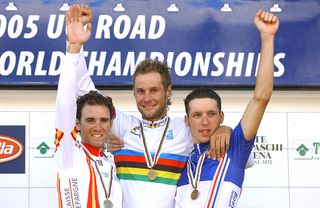
Salzburg 2006
Gold: Paolo Bettini (Italy)
Silver: Erik Zabel (Germany)
Bronze: Alejandro Valverde (Spain)
Valverde picked up where he left off at the end of 2005, winning La Flèche Wallonne and Liège-Bastogne-Liège in 2006 before finishing runner-up at the Vuelta a España ahead of the Worlds in Salzburg, Austria.
It was another display of opportunism, race craft, and well-executed tactics from the Spanish squad. The race had come together over the top of the final climb and, despite some short-lived attacks, the peloton entered the final kilometre seemingly on course for a mass sprint from a bunch of around 40 riders.
But then Samuel Sánchez appeared on the front under the flamme rouge and everything changed. Valverde was tucked onto the wheel as his teammate accelerated through a sweeping right-hand bend, and Xavier Florencio put the brakes on behind to create the split as they passed under a railway bridge. By the time they emerged into the light, through a left-hand bend, the Spanish duo were away with Paolo Bettini and Erik Zabel.
Sánchez continued his effort and led out the sprint for Valverde, a handful of seconds clear of the peloton, but the Spaniard was unable to live with Zabel and Bettini, the Italian overhauling the German to take his first world title. Spain's late play had essentially catapulted Valverde to a medal, but the nature of the riders who'd jumped aboard meant the rainbow jersey would continue to elude him.
"The team was awesome today," Valverde said. "Samuel Sanchez put himself flat out for me and created the selection with 700 metres to go. He is a great rider. If I made it here today it is thanks to him. But Paolo and Erik were just phenomenal. I'm still happy with my medal."
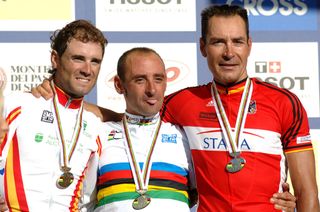
Valkenburg 2012
Gold: Philippe Gilbert (Belgium)
Silver: Edvald Boasson Hagen (Norway)
Bronze: Alejandro Valverde (Spain)
The first major disappointment for Valverde - who was making his first appearance at the Worlds since 2009, following the doping ban he received when his DNA was matched to blood bags from Operacion Puerto - and the first near-miss with a sense of controversy.
Spain had one of the strongest teams and had taken the initiative, with Alberto Contador, Juan Antonio Flecha, and Pablo Lastras in a break on the early local laps around Valkenburg. The race, however, was always going to come down to the late ascent of the Cauberg - the short, punchy climb used in the Amstel Gold Race. After some initial forcing from the Italians, Belgium's Philippe Gilbert bludgeoned his way clear, and was never seen again.
Valverde was initially absent from the shot as the reactions came, but soon enough he found himself up in a chase group with Edvald Boasson Hagen and Alexandr Kolobnev. That trio was nowhere near cooperative enough to peg back Gilbert, who already had a handsome margin in the final kilometre, and the gold medal was gone. Boasson Hagen claimed second place with a long-range sprint-cum-attack and Valverde had to settle for bronze as the rest of the field bore down.
In that group, seven places back, was three-time world champion Oscar Freire, and the fall-out began beyond the finish line.
"I felt good and I could have won," Freire insisted. "We had said that if someone attacked then they [teammates] would be with me on the final climb. It was presumed that someone must have stayed with me, but some were not able to and others did not want to."
Freire's comments didn't take much reading between the lines, but Valverde saw things rather differently.
"We could have had more. We wanted to bring Oscar through but he didn't have the legs. I held back a bit, waiting, then I saw I had to go on ahead, though by then it was already too late. Fuck… I think I could have won."
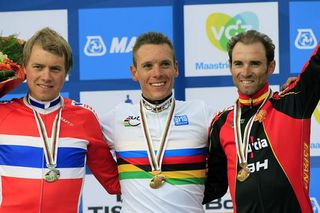
Florence 2013
Gold: Rui Costa (Portugal)
Silver: Joaquim Rodríguez (Spain)
Bronze: Alejandro Valverde (Spain)
The big polemica. Valkenburg had seen fault lines emerge in the Spanish camp, but it was a mere tremor compared to the destruction left in the wake of the 2013 Worlds in Florence.
The podium scenes are already stuff of Worlds legend. Over on the left, Joaquim Rodríguez is barely able to lift the bouquet of flowers above his head, and utterly unable to hold back the tears. On the right, Valverde looks sheepish, his eyes fixed on nothing in particular and certainly not to the man in matching kit over to his right. In the middle of the two stands a beaming Rui Costa, the Portuguese rider who can barely believe he is world champion. You can pretty much work out the story of the race from that one picture.
It was a rain-soaked, attritional day of racing in Florence, where only 61 riders made it to the finish. Rodríguez attacked with Vincenzo Nibali the final time up the Fiesole climb and they were joined on the descent by Valverde, Costa and Rigoberto Urán, though the latter soon crashed out of contention. Rodríguez accelerated up Via Salviati, and Nibali was the one who closed it down, dragging Costa and Valverde across. Rodríguez went again with two kilometres to go and this time Nibali didn't respond. Valverde, however, only seemed to have eyes for the Italian, and failed to react when Costa skipped away in pursuit of Rodríguez. Spain's numerical advantage had been swiftly wiped out and now Rodríguez was the underdog in a two-up sprint for the rainbow jersey. You can almost see Nibali asking Valverde what he's playing at. Sure enough, Costa, impervious to Rodríguez's somewhat desperate mind games, took the victory, while Valverde sprinted home for bronze 15 seconds later.
"The situation was perfect for Spain because I told Alejandro to go on the wheel of whoever chased after me," Rodriguez said. "When I saw Rui Costa come across alone, I didn't understand what had happened, but I knew I was riding for second."
The plot was thickened by the fact that Valvere and Costa were trade teammates at Movistar, but Valverde claimed no tactical culpability. "For sure I would prefer that this medal was gold, but if I didn't win it's only because I couldn't," he said. "When Rui Costa attacked he was very strong. I simply could do no more."
Valverde would later add: "Only Purito and I know what really happened and what was said during the race."
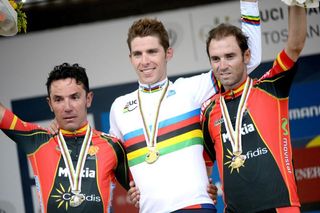
Ponferrada 2014
Gold: Michal Kwiatkowski (Poland)
Silver: Simon Gerrans (Australia)
Bronze: Alejandro Valverde (Spain)
After the Florence debacle, the build-up to the 2014 Worlds, on home soil, revolved around cooperation and the chances of a repeat or of redemption. Alberto Contador was initially included in Spain's plans but pulled out, leaving Valverde and Rodríguez at the helm once again.
This time, Spain seemed to unite more cohesively around Valverde, who was well suited to the rolling Ponferrada course. They did the lion's share of the work on the front of the peloton on the final lap to keep the breakaway riders in check, and Rodríguez turned about to be a loyal lieutenant, putting in the acceleration to split the group and set up a Valverde attack on the last incline in the final 5km.
But by then it was already too late. Michal Kwiatkowski had stolen a march and ripped up Spain's playbook by attacking on the downhill ahead of the penultimate climb. As he caught and passed the break, it was clear he was not someone who should have been given so much as an inch, despite his youth.
Valverde's attack lacked conviction and he was unable to get close to bringing back Kwiatkowski, who sat up and celebrated in the final metres as Valverde made one last grab for a medal in a reduced sprint. He came around Matti Breschel and held off Greg Van Avermaet, but was pipped to the line by Simon Gerrans.
"Seeing who was still there on the final lap, all very quick, and all looking at my wheel, I resigned myself to not even winning a medal," Valverde said.
A decade since Spain's last world champion, and the sixth time Valverde had visited the lower steps of the podium, the bronze medal seemed of little worth. In normal circumstances a party would have been thrown to mark the medal, but no one - neither Valverde nor his teammates - felt any cause for celebration.

Patrick is a freelance sports writer and editor. He’s an NCTJ-accredited journalist with a bachelor’s degree in modern languages (French and Spanish). Patrick worked full-time at Cyclingnews for eight years between 2015 and 2023, latterly as Deputy Editor.
